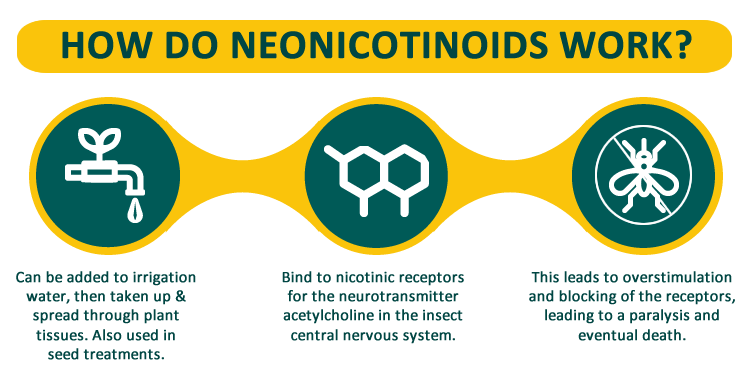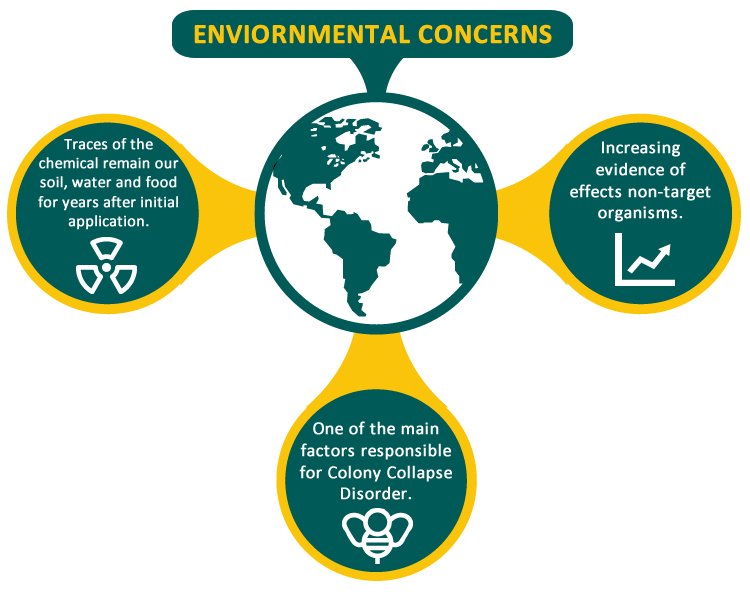“This is great news for bees and the environment. For years, evidence that these chemicals harm bees has been mounting. Now governments must eliminate these chemicals once and for all… and support the transition towards ecological methods of pest control.”
Franziska Achterberg, EU Food Policy Director of Greenpeace (2017)
The European Commission of the European Union has drafted a new regulation that would implement a comprehensive ban of neonicotinoids, the world’s most widely used insecticide. This new proposal would eliminate the use of neonicotinoids on any crops cultivated for commercial use, with the only exception being in heavily controlled environments such as closed greenhouses.
Why the exhaustive ban on one of the world’s most popular crop care chemicals? To put it simply: the pervasive overuse of synthetic pesticides in modern agriculture has contributed to a 40% decline of the bee population, and other pollinators, since 1950, creating significant issues for our global food supply.
First, we must examine the significance of pollinators to our global food supply. More than 20,000 species of bees, together with wasps, butterflies, moths, bats, birds and flies, have been pollinating our crops and flowering plants since the dawn of terrestrial life on Earth. Today, one-third of global food production depends on these pollinators.
.
Bees are one of the world’s most significant pollinators, they pollinate over 70% of all fruit, vegetables, seeds and oils on the planet. The volume produced of these crops has increased by 300% in the last 50 years. The Center for Ecosystem Studies in the Netherlands, in a study of wild bees spanning five continents and 1,400 agricultural fields, found that these bees contribute an average $3,215 per hectare to the production of crops. In other words, our dependence on bee-pollinated food is not only great, but has been growing steadily and will continue to do so if we are to feed the more than 9 billion people around the world.
The problem is that these bees and other essential pollinators are disappearing at unprecedented rates at a time when the global population is rising exponentially. Globally, hives have decreased by over 50% since 1950. In the United States, between April 2015 and April 2016, beekeepers lost 44% of all bee colonies. This marks the second year in a row that the same number of bees were lost during the summer as in the winter. Such a profound decline in the bee population has been widely attributed to the pervasive use of synthetic pesticides, in particular neonics.
Neonicotinoids, an insecticide based on a molecule similar to nicotine, is considered one of the main factors responsible for colony collapse disorder. There is strong scientific consensus that bees exposed to these synthetic pesticides suffer serious harm from the doses they receive. The European Food Safety Authority (EFSA) reviewed evidence submitted by the world’s largest pesticide manufacturers and concluded that Bayer’s imidacloprid and clothianidin, as well as Syngenta’s thiamethoxam, were of “high acute risks for bees” when applied to “most crops.”
.
Peer-reviewed science is catching up with the pesticide industry. Now is the time to end our reliance on synthetic pesticides such as neonics and take back control of our land and resources. The demand for natural products is spreading worldwide, with consumers becoming increasingly aware of the health and environmental benefits of an organic lifestyle. Environmentally friendly alternatives in crop care, by preventing the damages imposed by synthetic pesticides and fertilizers and maintaining biodiversity and soil health, will sustain natural land productivity and protect global health. We must invest in and utilize more natural, biodegradable, environmentally friendly and highly efficient alternatives in crop protection. One of the most effective solutions can be found in neem-based alternatives.
Primal Group is in the process of implementing bee colonies on-site at our neem plantations in Ceará, Brazil. We have partnered with the Federal University of Ceará, inviting students and professionals onto the plantations to study and demonstrate the viability of neem as a natural pesticide and fertilizer that function in harmony with beneficial insects such as bees.

